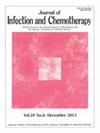Assessment of incidence and risk factors of COVID-19-associated candidemia using diagnosis procedure combination data
IF 1.9
4区 医学
Q3 INFECTIOUS DISEASES
引用次数: 0
Abstract
Background
Candidemia is an important coronavirus disease 2019 (COVID-19)-associated invasive fungal infection. Patients with COVID-19 may be susceptible to candidemia; however, evidence regarding its incidence, risk factors, and involvement in mortality is insufficient.
Objectives
To explore the incidence of and potential risk factors for candidemia in patients with severe or critical COVID-19 and evaluate the relationship between candidemia and mortality in patients with severe or critical COVID-19.
Methods
The incidence of candidemia in patients with severe and critical COVID-19 was evaluated using administrative claims data from acute care hospitals in Japan. Multivariable regression models were used to explore potential risk factors for candidemia and their contribution to mortality in patients with severe and critical COVID-19.
Results
Candidemia occurred in 0.3–1.1 % of patients with severe or critical COVID-19. Renal impairment, use of steroid, blood transfusion, and use of central venous catheter were potential risk factors for candidemia in patients with severe to critical COVID-19.
Conclusions
Candidemia in patients with COVID-19 was an independent risk factor for mortality. Candidemia in patients with severe to critical COVID-19 is a grave complication and may increase mortality.
利用诊断程序组合数据评估covid -19相关念珠菌的发病率和危险因素
背景:念珠菌病是一种重要的冠状病毒病2019 (COVID-19)相关侵袭性真菌感染。COVID-19患者可能易感染念珠菌;然而,关于其发病率、危险因素和与死亡率的关系的证据不足。目的:探讨重症、危重型COVID-19患者念珠菌的发病率及潜在危险因素,评价重症、危重型患者念珠菌与死亡率的关系。方法:利用日本急症医院行政索赔资料,对重症和危重型COVID-19患者念珠菌的发病率进行评估。采用多变量回归模型探讨念珠菌感染的潜在危险因素及其对COVID-19重症和危重型患者死亡率的影响。结果:重型、危重型患者中念珠菌的发生率为0.3 ~ 1.1%。肾功能损害、使用类固醇、输血和使用中心静脉导管是重症至危重型COVID-19患者念珠菌感染的潜在危险因素。结论:2019冠状病毒病患者念珠菌感染是死亡的独立危险因素。严重至危重型COVID-19患者中的念珠菌是一种严重并发症,并可能增加死亡率。
本文章由计算机程序翻译,如有差异,请以英文原文为准。
求助全文
约1分钟内获得全文
求助全文
来源期刊

Journal of Infection and Chemotherapy
INFECTIOUS DISEASES-PHARMACOLOGY & PHARMACY
CiteScore
4.10
自引率
4.50%
发文量
303
审稿时长
47 days
期刊介绍:
The Journal of Infection and Chemotherapy (JIC) — official journal of the Japanese Society of Chemotherapy and The Japanese Association for Infectious Diseases — welcomes original papers, laboratory or clinical, as well as case reports, notes, committee reports, surveillance and guidelines from all parts of the world on all aspects of chemotherapy, covering the pathogenesis, diagnosis, treatment, and control of infection, including treatment with anticancer drugs. Experimental studies on animal models and pharmacokinetics, and reports on epidemiology and clinical trials are particularly welcome.
 求助内容:
求助内容: 应助结果提醒方式:
应助结果提醒方式:


